For health-conscious shoppers looking to make mindful decisions about their diet, Whole Foods Market offers a shopping experience unlike any other. With its commitment to clean ingredients, sustainable sourcing, and rigorous quality standards, it has become a trusted destination for individuals who prioritize wellness. The store’s vast inventory features everything from fresh organic produce to specialized supplements, and knowing the best things to buy at Whole Foods can help you build a diet that supports energy, longevity, and disease prevention.
Whole Foods isn’t just a grocery store—it’s a curated marketplace for people serious about living healthier lives. Whether you’re new to clean eating or already well-versed in reading nutrition labels, understanding what to buy at Whole Foods helps you maximize the value of your trip. This article, backed by nutrition experts and guided by the principles of mindful eating, will explore the best items to buy at Whole Foods across a variety of essential categories. From pantry staples to functional drinks, we’ll show you how to navigate the aisles with intention, so your cart reflects the vibrant, nutrient-dense lifestyle you’re working to build.
You may also like: How a Whole Foods Diet Supports Sustainable Weight Loss: Expert Tips for Eating Whole Foods to Lose Weight Safely
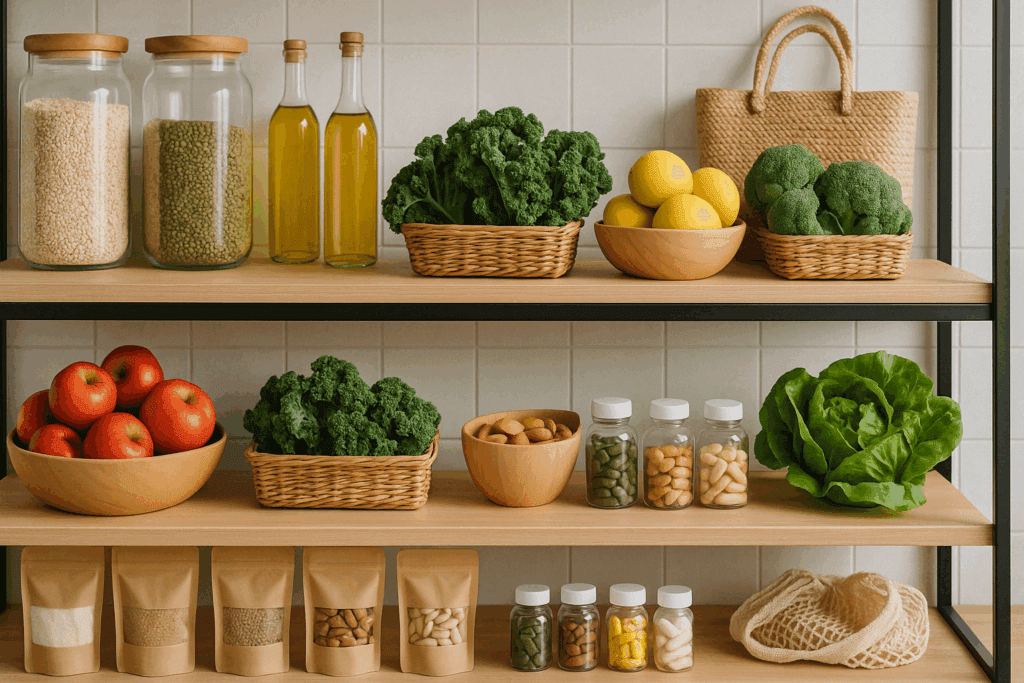
Why Nutrition Experts Recommend Whole Foods Market
Whole Foods has earned its reputation by setting high standards for food quality. With over 230 banned ingredients on their “unacceptable list”—including artificial flavors, colors, preservatives, and high-fructose corn syrup—it provides a level of ingredient transparency that is rare among major grocers. This makes it easier for consumers to shop with confidence, knowing that many of the best items at Whole Foods are inherently free of the additives that undermine long-term health.
Nutritionists appreciate that Whole Foods goes beyond marketing buzzwords and commits to real health through its sourcing policies, sustainability practices, and local partnerships. Whether you’re buying produce, snacks, or supplements, you’re choosing from products that have already met a higher nutritional and ethical bar. As a result, the best whole foods products available often start here, especially for shoppers seeking a balance between convenience and integrity.
The store’s knowledgeable staff, detailed food labeling, and curated product selection reflect a commitment to consumer education and empowerment. This reinforces Whole Foods’ place not just as a store, but as a wellness partner. If you’re aiming to transition to a healthier diet or upgrade the quality of the food you eat, knowing the best things to buy at Whole Foods Market can help you turn intention into consistent, health-boosting action.
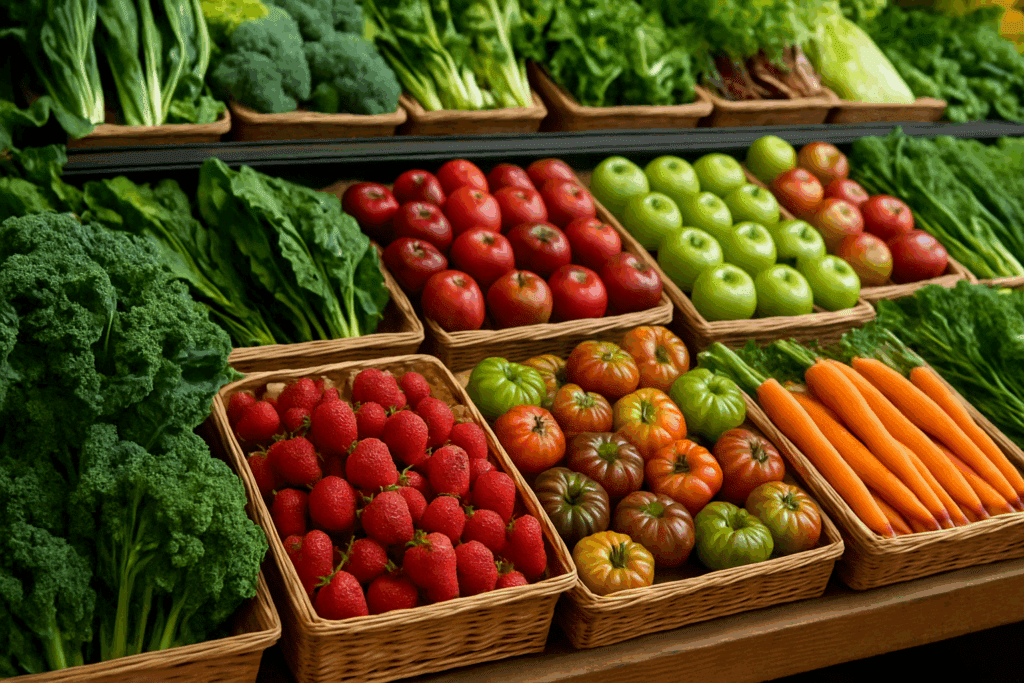
Organic Produce: Foundational Foods for Every Healthy Diet
The journey to better health often starts in the produce aisle. At Whole Foods, the produce section is filled with organic fruits and vegetables that meet USDA organic standards and are often sourced from local farms. These fresh, nutrient-dense options are some of the best things to buy at Whole Foods if you’re trying to reduce pesticide exposure and maximize the nutritional value of your meals.
Many experts agree that choosing organic makes a difference, particularly with high-pesticide crops like strawberries, spinach, apples, and kale. Whole Foods provides a variety of these options year-round, helping you build meals rich in fiber, antioxidants, and phytochemicals. The emphasis on seasonality also promotes better nutrient density and aligns with eco-conscious shopping practices.
One of the most overlooked benefits of shopping at Whole Foods’ produce section is the variety. Beyond basic salad greens and bananas, you’ll find unique items like golden beets, Romanesco cauliflower, and heirloom carrots. These provide culinary inspiration and ensure your diet includes a wide range of micronutrients. When people ask what to buy at Whole Foods for a cleaner, more plant-forward lifestyle, organic produce is always at the top of the list.
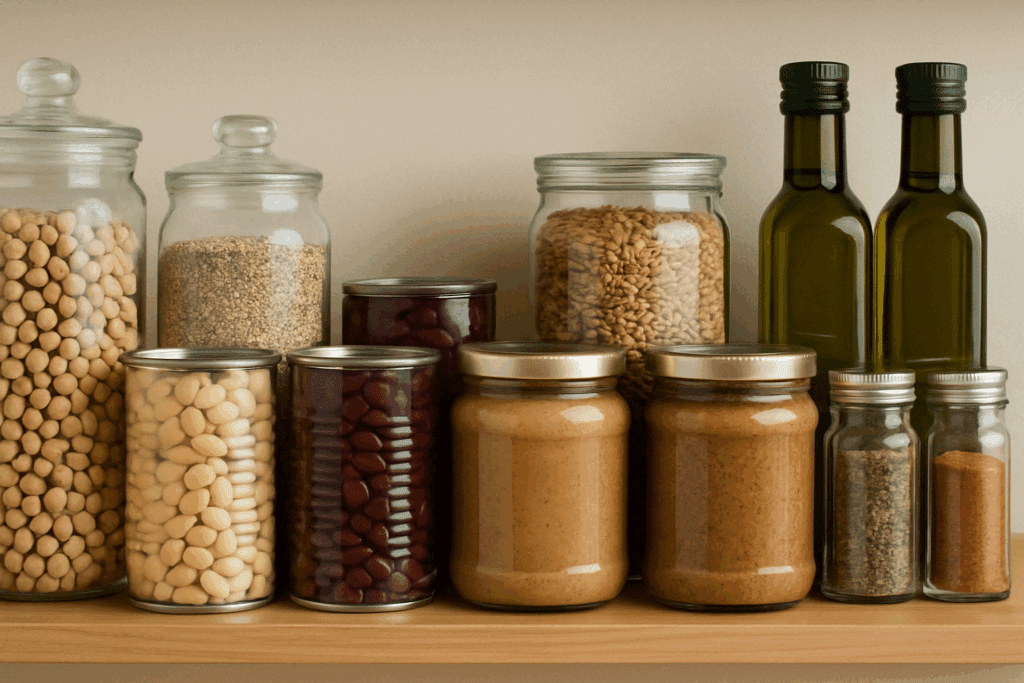
Pantry Essentials That Combine Convenience with Nutrition
The pantry section at Whole Foods is stocked with high-quality staples that are essential for preparing nutrient-rich meals at home. Whole grains like farro, barley, quinoa, and brown rice are abundant, providing fiber, complex carbohydrates, and key minerals. Unlike refined grains, these whole versions help regulate blood sugar and keep you feeling full longer, making them ideal for weight management and metabolic health.
Beans, lentils, and legumes are available in both dry and BPA-free canned varieties, offering affordable sources of plant-based protein and iron. These staples are often listed among the best items to buy at Whole Foods for those following vegetarian, vegan, or Mediterranean diets. They support heart health, digestive function, and blood sugar stability—and they’re incredibly versatile in cooking.
Another key category includes healthy oils and nut butters. Whole Foods’ 365 brand offers cold-pressed olive oil, organic avocado oil, and tahini without preservatives or added sugars. Almond butter and peanut butter here tend to contain just one or two ingredients, free of palm oil or artificial stabilizers. These pantry picks are some of the best things at Whole Foods for those aiming to support brain health and reduce inflammation while preparing flavorful meals at home.
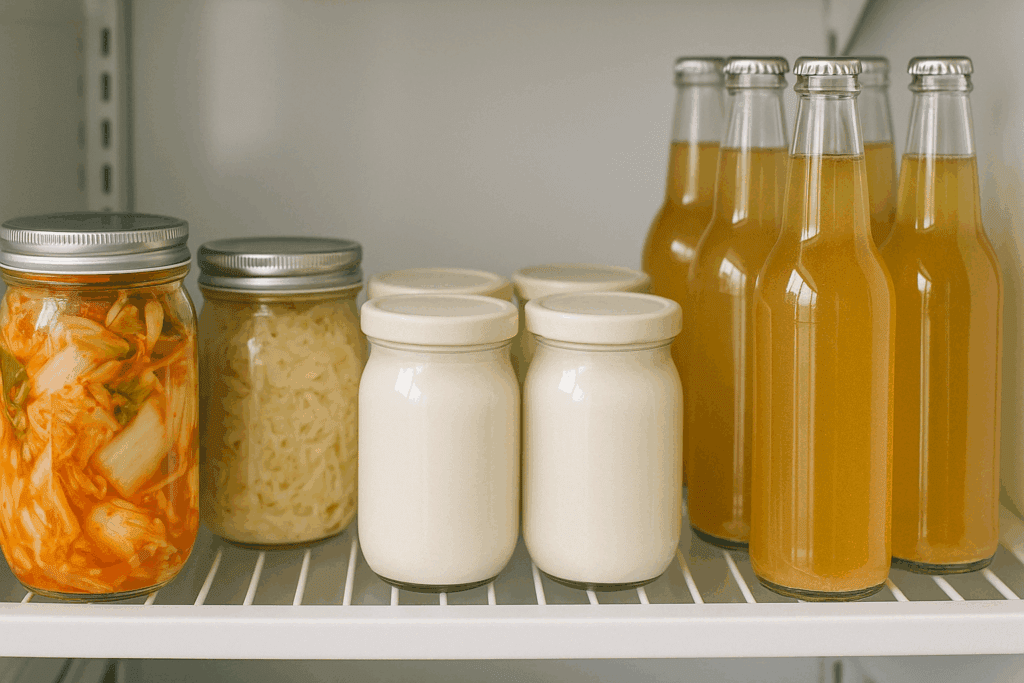
Refrigerated Foods That Support Gut Health and Immunity
The gut microbiome is central to overall health, affecting everything from digestion and immunity to mental well-being. Whole Foods makes it easier to support gut health through its broad selection of probiotic-rich and fermented foods. Whether you’re looking for dairy-free yogurts, raw sauerkraut, or kombucha, the store’s refrigerated section offers options that are both delicious and evidence-based.
Plant-based yogurt alternatives made with almond, coconut, or cashew milk frequently include live cultures and minimal added sugar, which supports microbiome diversity without compromising dietary restrictions. Fermented vegetables like kimchi and pickled beets add a tangy flavor to meals while providing natural probiotics and fiber. These offerings are consistently ranked among the best items at Whole Foods by nutritionists who prioritize digestive support.
Pre-marinated tofu, tempeh, and sprouted grain breads are also available, offering easy ways to incorporate high-protein, gut-friendly foods into your diet. For shoppers exploring what to buy at Whole Foods to enhance digestion and immunity, this section delivers real, functional nutrition backed by science.
Frozen Foods That Make Healthy Eating More Convenient
The frozen section at Whole Foods defies the stereotype of frozen food being unhealthy. It’s filled with options that save time without sacrificing nutrition, including organic vegetables, fruit, grain blends, and complete meals made with whole ingredients. These freezer finds are among the best things to buy at Whole Foods Market if you’re looking to prepare healthy meals quickly.
Frozen organic blueberries, for instance, retain more antioxidants than many fresh berries due to being flash-frozen at peak ripeness. Pre-cut vegetables like riced cauliflower and spiralized zucchini can be sautéed or roasted in minutes, offering low-calorie meal bases that are both satisfying and blood sugar-friendly. Many dietitians recommend these products to clients who struggle with meal prep but want to stick to a whole-foods approach.
You’ll also find plant-based frozen entrees made with lentils, quinoa, sweet potatoes, and greens—options that feel comforting without the guilt. They’re great for lunch at the office or for busy evenings when cooking from scratch isn’t realistic. These selections consistently rank among the best whole foods products because they support consistent eating habits even when life gets hectic.
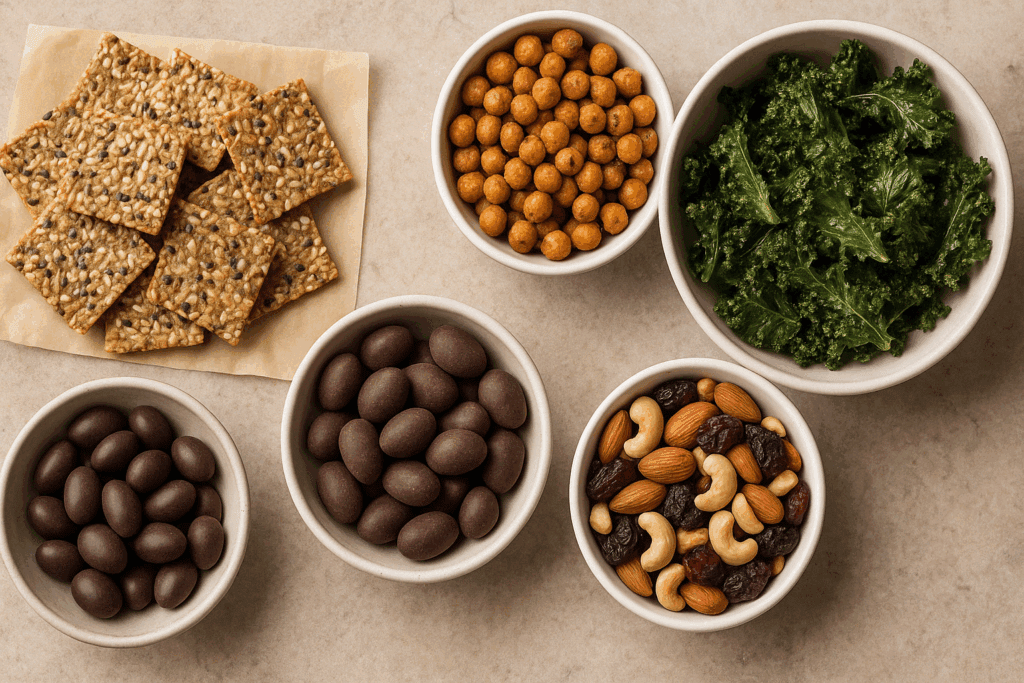
Smart Snacks That Satisfy Without Derailing Your Goals
Whole Foods makes it easier to snack smart. Instead of high-sugar, empty-calorie options, the store offers snacks made with clean ingredients that keep hunger at bay and provide nutritional value. Seed-based crackers, roasted chickpeas, and kale chips offer fiber and crunch without excess salt or artificial flavorings.
The store also stocks a wide variety of protein bars, many of which contain whole-food ingredients like dates, nuts, and pea protein. These are especially helpful for people managing blood sugar or needing a post-workout energy source. Items like these consistently make the list of best items to buy at Whole Foods because they balance convenience, satisfaction, and health.
Nuts, trail mix, and dried fruit with no added sugar provide an easy way to snack on the go. Whole Foods even reimagines indulgences with dark chocolate-covered almonds, coconut milk ice cream, and grain-free cookies that don’t spike blood sugar. When shoppers ask what to buy at Whole Foods to keep their snack drawer aligned with health goals, these smart, portion-conscious choices are a go-to.
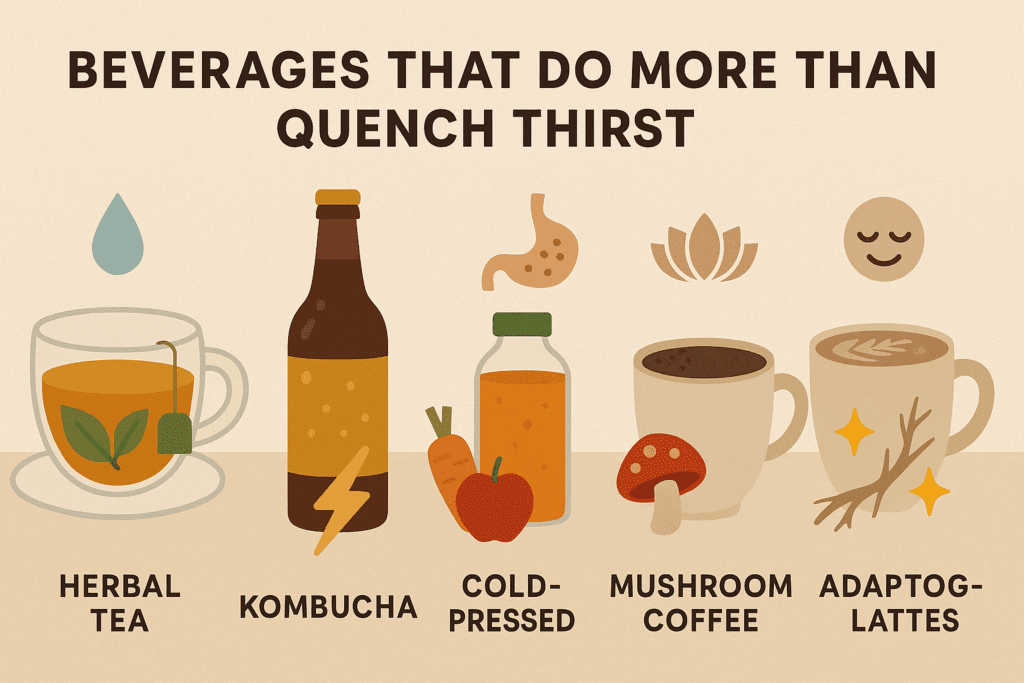
Beverages That Do More Than Quench Thirst
From herbal teas to adaptogenic lattes, the beverage aisle at Whole Foods offers functional drinks that go beyond hydration. Sparkling waters infused with botanicals like lavender and hibiscus provide refreshing options without sugar or artificial flavors. Cold-pressed juices, ginger shots, and kombucha deliver antioxidants and probiotics that support inflammation reduction and gut balance.
Protein shakes, green smoothies, and mushroom-based coffee alternatives provide sustained energy without the crash of sugary energy drinks. These options are especially appealing for shoppers who want performance-enhancing or calming beverages that don’t compromise on health. Many of the best things at Whole Foods are found in this category because they offer a unique combination of taste, nutrition, and purpose.
These beverages are ideal for anyone working to support adrenal function, reduce caffeine dependence, or simply hydrate better throughout the day. By knowing what to buy at Whole Foods in the drink aisle, you can transform your daily habits in small but powerful ways.
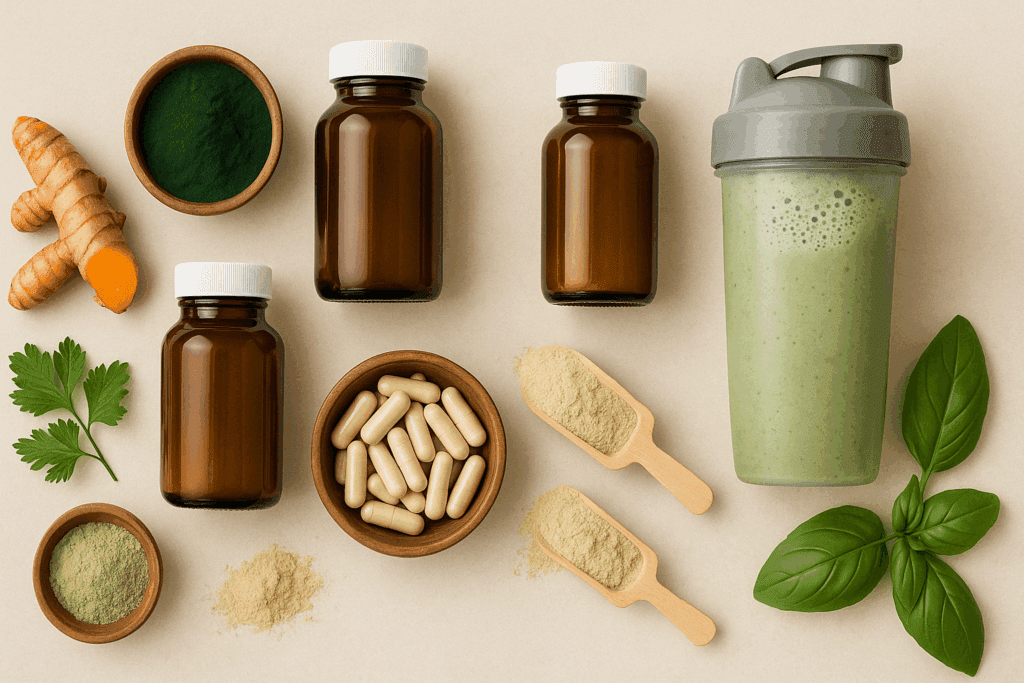
Wellness Products and Supplements That Fill Nutritional Gaps
While a nutrient-rich diet is the foundation of health, supplements can help fill the gaps. Whole Foods carries a range of food-based vitamins, omega-3s, probiotics, and herbal remedies that meet strict purity and sourcing criteria. These offerings are recommended by many integrative and functional health practitioners because they avoid fillers, artificial binders, and synthetic colors.
Among the best whole foods products in this section are turmeric capsules for inflammation, magnesium glycinate for sleep and muscle recovery, and algae-derived omega-3s for heart and brain health. These supplements support targeted needs and are often third-party tested for quality. If you’re unsure what to buy at Whole Foods to complement your clean diet, these wellness essentials are a smart starting point.
Additionally, superfood powders like spirulina, maca, and beetroot are available to enhance smoothies and juices. These concentrated nutrient sources can support endurance, hormone health, and immune function when used consistently. Whole Foods staff are typically trained to assist with supplement selection, helping you choose the best things to buy at Whole Foods Market based on your specific goals and lifestyle.
Frequently Asked Questions (FAQ): Smart Picks at Whole Foods Market
Enhancing your healthy shopping experience with expert-backed insights
1. How can I maximize the value of my grocery budget while shopping for the best whole foods products?
While Whole Foods Market has a reputation for being pricey, savvy shoppers can still fill their carts with nutrient-dense options by focusing on house brands and bulk bins. The 365 Everyday Value line offers many of the best items to buy at Whole Foods without the premium price tag—ranging from organic beans and whole grains to frozen vegetables and nut butters. Shopping the bulk section for oats, lentils, and seeds can also lower costs while reducing packaging waste. Timing your visits to coincide with weekly sales and using the Whole Foods app for digital coupons can help you save significantly on the best things at Whole Foods. Pair these strategies with meal planning and you’ll make the most of what to buy at Whole Foods without straining your budget.
2. Are there specific Whole Foods departments where shoppers often overlook the best health-focused products?
Yes, several underrated departments house some of the best whole foods products available. For instance, the bulk spice section offers high-quality seasonings and medicinal herbs at a fraction of the cost of pre-packaged varieties, making it a hidden gem for home cooks focused on anti-inflammatory or immune-boosting diets. The refrigerated beverage case near the checkout often features probiotic shots and adaptogenic drinks that many overlook. Likewise, the beauty and body care section contains clean, third-party-tested supplements and topical wellness products. Exploring beyond the typical grocery aisles can reveal more of the best things to buy at Whole Foods Market—especially for those seeking integrative health tools beyond food.
3. How do I know if a Whole Foods product meets high nutritional standards?
Whole Foods’ internal quality assurance team evaluates products against its banned ingredient list, but shoppers can go a step further by checking for third-party certifications. Labels such as USDA Organic, Non-GMO Project Verified, Certified Gluten-Free, and Fair Trade add layers of credibility. Additionally, scanning ingredient lists for whole, recognizable components is a smart practice. When evaluating the best items at Whole Foods, those with minimal processing, zero added sugars, and short ingredient lists are generally the most aligned with healthful eating. Looking for functional benefits—such as omega-3s, fiber content, or probiotic inclusion—can help refine your selection of the best items to buy at Whole Foods for targeted wellness goals.
4. How does Whole Foods cater to people with specific dietary needs like low-FODMAP, paleo, or keto?
Whole Foods Market is well-known for catering to niche and therapeutic diets through curated labeling and inclusive product sourcing. For those on a low-FODMAP plan, you’ll find certified snacks, plant-based broths, and condiments without garlic or onion. Keto followers can choose from almond flour tortillas, sugar-free chocolate, and MCT oil products that support fat-adapted eating. Paleo shoppers can access clean protein bars, grass-fed jerky, and ancient grains like teff and amaranth. These specialty items represent some of the best things at Whole Foods for people managing chronic health conditions or adopting therapeutic diets under professional guidance. Knowing what to buy at Whole Foods becomes easier with their helpful signage and diet-specific filters on their mobile app.
5. What should new shoppers prioritize if they’re transitioning to a cleaner, more plant-based lifestyle?
Newcomers to plant-based eating often benefit from focusing on versatile, nutrient-dense staples that can be used across multiple meals. Some of the best items to buy at Whole Foods for this transition include canned or dry lentils, frozen edamame, unsweetened plant milks, and nut-based cheeses. Whole Foods also carries whole-food meat alternatives like tempeh and jackfruit that aren’t ultra-processed, which is important for staying aligned with a whole-food approach. Instead of starting with processed vegan substitutes, prioritize the best whole foods products like raw nuts, seeds, avocados, and leafy greens. These items build the nutritional foundation of a plant-forward lifestyle and make it easier to move away from overly refined products.
6. Are there seasonal or limited-time offerings that qualify as the best things to buy at Whole Foods Market?
Absolutely—seasonal rotations are a core strength of Whole Foods, and many of the best things to buy at Whole Foods Market appear only at specific times of the year. In the fall, you might find turmeric-infused soups, locally sourced heirloom squash, or limited-batch apple ciders. Spring often brings wild ramps, pea shoots, and probiotic spring tonics. Whole Foods also partners with local artisan brands to provide regional exclusives, such as fermented salsas or sprouted breads. These products not only support local economies but also offer unique nutritional benefits that change with the seasons. Savvy shoppers stay attuned to these rotations to take advantage of limited-edition versions of the best items at Whole Foods.
7. What role does Whole Foods play in supporting sustainable and regenerative agriculture practices?
Whole Foods works closely with farms and producers that meet stringent animal welfare, environmental, and labor standards, often going beyond industry baselines. Many of the best whole foods products found in-store are certified by programs like Regenerative Organic Certified, which prioritize soil health, biodiversity, and carbon sequestration. Products from these partnerships often include grass-fed dairy, organic produce, and fair-trade coffee or chocolate. Choosing these items not only supports your health but also contributes to ecological well-being. When considering what to buy at Whole Foods for both personal and planetary health, these regenerative offerings provide high-impact, ethically sound choices.
8. How does Whole Foods ensure the freshness and quality of their produce and perishables?
Whole Foods maintains short supply chains by working directly with local and regional producers, reducing the time it takes for perishables to reach store shelves. Many stores receive daily shipments of fresh produce and seafood, and they use strict cold-chain management systems to preserve freshness. This ensures that some of the best items to buy at Whole Foods—including delicate greens, berries, and sustainably caught fish—retain their nutritional integrity. Additionally, in-store staff are trained to rotate stock frequently and discard under-quality items promptly. For customers looking for peak nutrition, these high-quality handling practices make the produce and perishable departments reliable sources for the best things at Whole Foods.
9. What are some ways to use Whole Foods’ products to support mental wellness and cognitive health?
Whole Foods stocks a wide array of products rich in nutrients known to support brain health, such as omega-3 fatty acids, magnesium, polyphenols, and B-complex vitamins. Fatty fish like wild salmon, flaxseed oil, and walnuts are among the best whole foods products for boosting cognition and mood. You’ll also find adaptogenic teas with ashwagandha or rhodiola that may help regulate stress responses. For mental clarity, shoppers might choose dark chocolate with 85% cacao or lion’s mane mushroom powders to add to smoothies. These smart additions to your shopping list highlight the best things to buy at Whole Foods for supporting cognitive resilience in today’s high-stress environment.
10. Can I build a comprehensive wellness routine just by shopping at Whole Foods?
Yes, Whole Foods Market offers all the components of a well-rounded wellness routine, from food and supplements to personal care and home cleaning. You can stock your pantry with anti-inflammatory spices, fill your fridge with gut-friendly fermented foods, and use clean household products free of endocrine-disrupting chemicals. Additionally, many stores offer educational workshops or guided tours that help new shoppers understand the best items at Whole Foods for their goals. You’ll also find sustainable yoga mats, toxin-free skincare, and herbal teas that complement a holistic lifestyle. Knowing what to buy at Whole Foods—and how to use those products across every aspect of your day—enables you to align your health, home, and habits under one trusted roof.
Conclusion: Your Roadmap to the Best Things to Buy at Whole Foods for a Healthier Lifestyle
Shopping at Whole Foods Market is more than an errand—it’s a commitment to nourishing your body with intention and care. Every aisle is designed to support informed, health-conscious choices, offering clean, nutrient-dense options that align with evidence-based nutrition. Whether you’re exploring organic produce, looking for the best pantry staples, or searching for functional snacks and supplements, knowing what to buy at Whole Foods empowers you to make decisions rooted in wellness rather than convenience alone.
From dietitian-recommended plant-based meals to smart hydration options and gut-friendly probiotics, the best items at Whole Foods reflect a holistic view of health. These aren’t just trendy products; they’re grounded in nutritional science and crafted to help you thrive. By filling your cart with the best things to buy at Whole Foods Market, you’re not just investing in groceries—you’re investing in your energy, your longevity, and your future.
Ultimately, mindful shopping habits are an extension of a mindful life. And with the right guidance, Whole Foods becomes a powerful ally in your journey toward better health—offering the best whole foods products available in today’s marketplace, all under one roof.
Was this article helpful? Don’t let it stop with you. Share it right now with someone who needs to see it—whether it’s a friend, a colleague, or your whole network. And if staying ahead on this topic matters to you, subscribe to this publication for the most up-to-date information. You’ll get the latest insights delivered straight to you—no searching, no missing out.
Further Reading:
31 Healthier Picks At The Grocery Store
Disclaimer
The information contained in this article is provided for general informational purposes only and is not intended to serve as medical, legal, or professional advice. While NewsHealthWatch strives to present accurate, up-to-date, and reliable content, no warranty or guarantee, expressed or implied, is made regarding the completeness, accuracy, or adequacy of the information provided. Readers are strongly advised to seek the guidance of a qualified healthcare provider or other relevant professionals before acting on any information contained in this article. NewsHealthWatch, its authors, editors, and contributors expressly disclaim any liability for any damages, losses, or consequences arising directly or indirectly from the use, interpretation, or reliance on any information presented herein. The views and opinions expressed in this article are those of the author(s) and do not necessarily reflect the official policies or positions of NewsHealthWatch.

